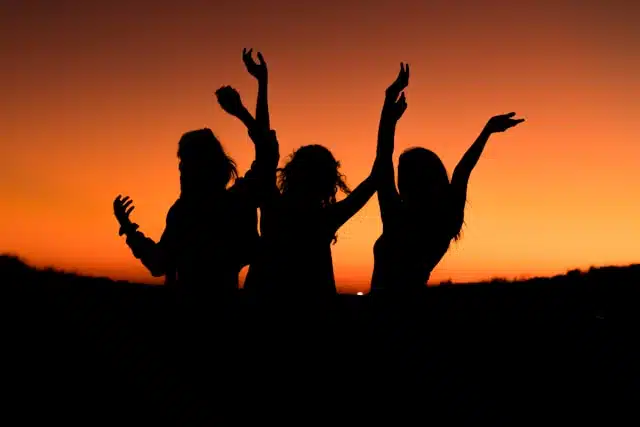While Scandinavia and Ireland typically maintain the strongest tradition of Pagan celebration, Ontario is abundant with lively festivals that honor the season and bring like-minded people together. Because of the province’s mix of natural landscapes, wide open spaces, multicultural communities, and interest in alternative spirituality, it has naturally become a rich region for Pagan celebrations. Rural meadows set the stage for Beltane rituals, and urban centers frequently host fall markets, blending both traditional customs and modern adaptations. And with all four seasons distinctly marked, Ontario provides the perfect backdrop for gathering year-round.
Imbolc and the End of Winter
Imbolc is traditionally held on February 1st, a festival marking the end of winter and the first signs of spring. Ontario’s difficult winters make this time of year especially meaningful, as it reminds us of renewal, light, and warmer days not far away. Specifically, Imbolc honors the goddess Brigid, who is associated with inspiration, fertility, and healing. Gatherings often center around lighting candles, crafting Brigid’s crosses, and holding unique rituals that align with the themes of growth and renewal. It’s a fantastic time to both reflect on what’s behind us and prepare for what’s to come.
Springtime Rituals and Beltane Traditions
Spring in Ontario is often a sigh of relief for its residents, as harsh winters often leave people no choice but to cozy up indoors and wait for the snow to subside. With the return of warmth and light on the horizon, outdoor gatherings are often on the agenda. You’ll often find meadows and other natural spaces marked with maypoles, bonfires, and circle dances to honor abundance and life. Gaelic festival Beltane, also known as May Day, is held on May 1st and is the perfect time to offer herbs, flowers, and other symbolic tokens to deities and spirits. In return, they offer protection and prosperity in the coming months.
While these activities are all about tradition, they’re also a great excuse to bring people together to share stories, food, and music. Even in the big city of Toronto, small urban parks and green spaces still provide ample opportunity to host Beltane workshops or circles in modern yet meaningful ways.
Summer Gatherings and Harvest Celebrations
When the weather starts warming up and the summer approaches harvest season, Pagan festivals turn their attention to honoring the sun and the bounty of the earth. There’s nothing quite like feeling the tenderness of the sun’s rays hitting your bare skin and the sweet abundance of summer fruits and harvest. Now is the perfect time for dancing, energetic gatherings, and music, with festivals like Litha (the Summer Solstice) in mid-June and Lughnasadh on August 1st.
Litha marks the sun’s peak energy, and Pagans typically celebrate with vibrant colors and bonfires. For Lughnasadh, it’s all about crafts and connecting to the land, with feasts featuring wheat, bread, and corn symbolizing the first harvests. Many also incorporate personal reflection at this time of year, considering what has come to fruition in the past year and expressing gratitude in some way.
Fall Festivals and Mabon
Once summer fades, pagan communities prepare for the fall, which leads them deeper into reflection and preparation for the colder months. Mabon is the first holiday celebrated on the autumnal equinox, which occurs around September 21st. It marks the midpoint between the summer and winter solstices, which is why the focus here is balance. The festival calls for celebrating night and day in equal measure and themed crafts that symbolize the cycles of nature. Like for non-pagans, meals during this time typically include corn, squash, and apples, while classic crafts like corn dollies and wreaths help celebrate the harvest.
In late fall, Samhain follows, celebrated from October 31st to November 1st. It signals the end of the harvest season and the start of the dark half of the year. While many confuse Samhain and Halloween, Halloween is a secular holiday that has evolved from Samhain traditions. Instead of focusing on pure fun, Samhain has spiritual and ritual significance to Pagans. The ancient Celtic festival is a time to reflect on life and death and commune with spirits, which is why people gather for candlelight ceremonies and to share stories that honor the dead.
Modern Expressions of Seeking Fortune
Pagan festivals are known to connect people to ancient rituals relating to seasonal change and abundance—something that many Ontarians seek out. Even beyond traditional pagan celebrations, inviting and welcoming prosperity into our lives takes on different forms. People seek luck and plenty in all kinds of places, whether it’s entering a contest, playing the lottery, trying their hand at the hottest casino games in Ontario, or participating in trivia night.
While these methods might not have the sacred weight of traditional festivals and rituals, they stem from the same desire for abundance—just without the spirituality. Instead, the parallels are all about human emotions driven by possibility, hope, joy, and desire for security.
Notable Pagan Festivals
Curious about where you can experience the best pagan celebrations in the province? Pagans and those looking to explore spirituality can find a variety of festivals and gatherings, including family-friendly Wic-can Fest at Sparrow Lake Camp. Set on a 126-acre property, the festival spans nearly five days, featuring healing workshops, rituals, dancing, drum circles, arts and crafts, herb walks, and other exciting activities that celebrate nature and community. Other less mainstream and smaller-scale events can be found if you look deep enough, whether through a forum, a Facebook group, or local networks. No matter the size or style, each moment represents a chance to connect with the seasons and pagan traditions.
Featured image courtesy of Levi Guzman / Unsplash.com

